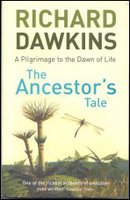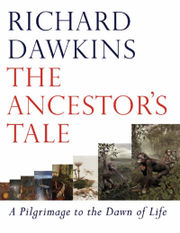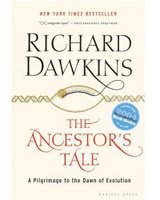 The Ancestor's Tale: A Pilgrimage to the Dawn of Life
The Ancestor's Tale: A Pilgrimage to the Dawn of Life
- Richard Dawkins (2004)
Rating: (5/5
Aardvarks)

Ratings explained at
King Aardvark's Library "If you were to read only one biology book ever, this should be it."
"If you were to read only one biology book ever, this should be it." -
King AardvarkThe Ancestor's Tale: A Pilgrimage to the Dawn of Life (2004) by Richard Dawkins is a remarkable book. The book's premise is, starting with humans, to go back in time to rendezvous with the most recent common ancestor, which Dawkins terms a "concestor" (boy, this guy sure likes making up words), of us and another group of still living organisms. (For instance, in the distant past, one of these meetings is between all the mammals, including us humans, and the group of birds and lizards. We never meet dinosaurs; they are extinct, so they don't count, but they are represented by their surviving family members, the birds.) The book is designed to emulate the format of
Geoffrey Chaucer's The Canterbury Tales, where pilgrims meet on the way to their destination and tell tales.
The overarching story is that of time-traveling discovery:
who, rather than
what, is around the next corner? Dawkins traces the evolutionary branchings of life, taken from a well-justified anthropocentric position (as humans, we're tracing our own geneology), giving approximate dates where possible and explaining the importance of each set of organisms.
Frequently, when each set of organisms join, a joining species will tell a tale. Each tale is a stand-alone essay that uses something relevant to the particular species to explain something truly important about evolutionary biology. Sometimes it's about a speciation mechanism, like sympatric or allopatric speciation; sometime it's about organisms rafting to islands and miniaturizing; sometimes it's about techniques used by evolutionary biologists, like molecular clocks, dendrochronology, etc; sometimes it's about convergent evolution, or hypotheses into the development of the brain, or Dawkins's own favourite topic, selfish genes. These tales provide a feast of biological tidbits and are the true masterpieces of this book.
This is truly a magnificent book. I felt like I was actually traveling backward through time, and sharing in the monumental discoveries of past biology, until, finally, a rapid-fire crescendo of sponges, plants, the Great Rendezvous of the first eukaryote, bacteria, then the cathartic climax of reaching our evolutionary Canterbury: the mysterious beginnings of life. On this, Dawkins wisely leaves it to conjecture; it could be RNA world or it could be other things we haven't even thought of yet.
It is well-written, fast paced, comes in easily-digestible morsels, and full of cutting-edge science, all easily accessable to the layman. Dawkins comes across as delightfully inquisitive and genuine. One of the most admirable things I noticed about
The Ancestor's Tale is how freely Dawkins would admit that there remain things yet unknown. For instance, in many cases, he points out a disagreement between scientists about where certain animal groups branch, then explains why he chose one scheme over another, and that future data could cause our understanding of these relationships to change. He even has a couple of places where the order of meeting concestors is still up in the air. He never gives the impression that he is all-knowing or infallable, and I felt respected as a reader because of this.
I was disappointed, however, with the bias toward animals shown by Dawkins. The section on fungi is brief; plants, arguably the most important organisms, are treated only slightly better. Archaea are almost entirely avoided. The early interplay of genes between the primitive Archaea, Bacteria, and Eukarya is merely skimmed over. There is hardly any discussion about the status of viruses or prions to speak of.
One minor complaint is that the essays about the biology topics are linked to a particular organism that exhibits the topic the best. While this is logical, it also results in problems where vitally important topics are not discussed early enough. For example, the essay on dating historical artifacts, fossils, and geological formations is told during the Redwood's Tale, notably because these large old trees can help us date organisms via dendrochronology. Dating of other types are discussed, too, including paleomagnetic and radiometric dating. Understanding how these dating methods work is essential for building the trust of those skeptical of science. How many times have I heard the "you use the rocks to date the fossils, but you use the fossils to date the rocks" argument? Unfortunately, Redwoods are plants, and plants separated from animals so far in the distant past that this tale is not told until page 526 out of 629 pages (in my version).
Speaking of versions, the one I read has the cover shown at the top of this post. It is a thick paperback that benefits from having four sections of full-colour plates, for a total of 50 photographs. This is the British/Canadian paperback version.
The Ancestor's Tale was originally published in a very hefty hardcover version (
Below Left) that many have criticised as an unsuccessful coffee-table book. The American version, both hardcover and paperback, (
Below Right), subtitled
A Pilgrimage to the Dawn of Evolution, is inferior to the British version since it lacks the colour photos. All in all, I think my version is the best ;-)


Dawkins occassionaly leaves science to the side to wage a campaign against the current Bush administration in Washington. I agree with his rants in this case, but worry that when Bush is no longer in power (
Hallelujah!) the book will seem dated.
He also plugs his other books repeatedly, especially
The Selfish Gene,
The Extended Phenotype,
The Blind Watchmaker, and
Climbing Mount Improbable. At times, his views can seem overly reductionist (genes as the only unit of selection, etc.) but I found that he was quite well balanced in this book, preferring to let his previous works speak for him on this matter.
Dawkins brings up much-maligned German biologist Ernst Haeckel on several occasions in this book, all in a positive light, mostly about his beautiful biological drawings and his insight into the relationship between hippos and elephants. I suspect that Dawkins is intentionally doing this to irritate proponents of the ID/Creationism camp that love to use
Haeckel's embryo drawings as an argument against evolution.
("Hey! you stupid creationists! Not only are Haeckel's embryo drawings still relevant, but we LOVE Ernsty!")And speaking of Creationists, Dawkins does get in a few jabs here and there. Given his militant atheist view, it was astounding that he kept the anti-theism in this book to a minimum, anly allowing it to rear its head at the books conclusion:
'Pilgrimage' implies piety and reverence. I have not had occasion here to mention my impatience with traditional piety, and my disdain for reverence where the object is anything supernatural.... My objection to supernatural beliefs is precisely that they miserably fail to do justice to the sublime grandeur of the real world.
In the final verdict, I have to say this is the best overall book for explaining evolution to non-biologists. It's not perfect, but its scope and power make it more than deserving of 5
aardvarks. As Dawkins deservedly gloats:
It is not pride in my book but reverence for life itself that encourages me to say, if you want a justification for the latter, open the former anywhere, at random.
If you were to read only one biology book
ever, this should be it. Go out and buy it, and tell your friends.
Duration: About 4.5 weeks.
Read about it on
Wikipedia.
Return to
King Aardvark's LibraryLabels: biology, books















